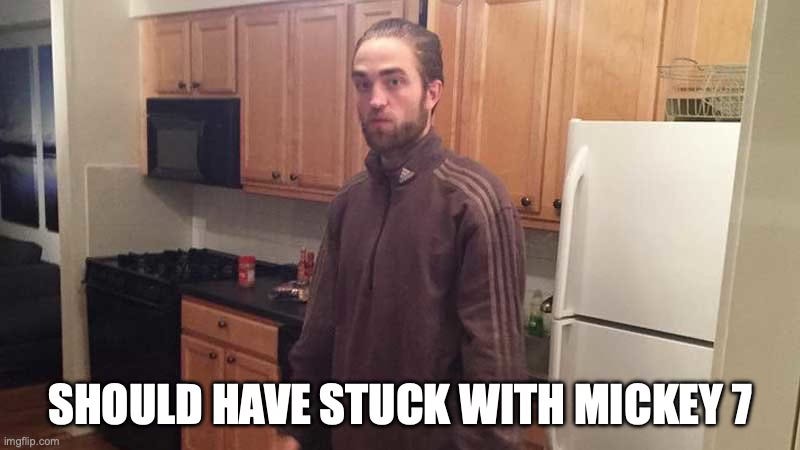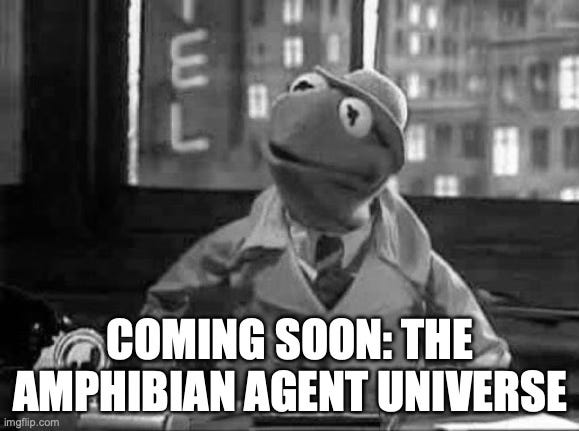The Incomplete Guide to Mickey 17, and The Frog Detective
In which Robert Pattinson clones solve problems in space and frogs solve crimes
An Incomplete Guide to Mickey 17
By Elliot Wengler
Oh Mickey, you’re so fine, you blow my mind, hey Mickey 17: it just didn’t work for me.
Bong Joon Ho earned himself a place in the history books in 2020, when his seminal work, Parasite, a comedy/thriller/horror about class struggle and family values, won Best Picture at the Academy Awards and grossed $258m. It was the first non-English language film to win this category, and annoyed the former host of the US Apprentice. It was the last big cinema visit for many before the pandemic, and its constant genre-shifting was particularly memorable.
That it has taken five years for a follow-up to such a victory is surprising, and the result is quite disappointing. Sure, his legacy has been felt elsewhere: while Hallyu was in motion many years prior, Joon Ho’s success saw it crest, with the Korean cultural exports that followed more easily becoming mainstream - from dramas and soaps to Squid Games, from K-Pop bands and films like Broker and Monster.
That brings us to Mickey 17, adapted from Edward Ashton’s 2022 science fiction novel, Mickey 7. Robert Pattinson is Mickey, a man who is desperate to escape Earth (which seems to be in decay in the near-future of this movie), joins a space expedition as the crew’s ‘expendable’. He is a runt, who will take on suicidal and experimental tasks in the knowledge that he will be reprinted each time. Mickey is a weedy and pathetic man, but like great Orwellian dissidents in other dystopia, he has a rebellious streak against the oppressive regime: he and Nasha (Naomi Ackie) have a sexual relationship in a world, well, ship, where every calorie is accounted for.
Upon arriving on the planet intended for colonisation and populating, Niflheim, Mickey 17’s mission goes awry in that he survives. Escaping with the help of the tardigrade-like local creatures that the shipmates name creepers, he returns to his room to find that Mickey 18 has already been printed: chaos ensues, as the two should not co-exist.
Mickey 18 possesses darker and more aggressive impulses, and the two find themselves in conflict of how to deal with the bullies and other dark souls on the ship. This leads to Mickey 17 dining with the expedition’s leader, Kenneth Marshall, (Mark Ruffalo) and his wife, Ylfa (Toni Collette), playing scene-chewing and deliciously creepy, evil parodies of every bad politician you can think of.
Finding inspiration in Donald Trump’s overall creepy and self-obsessed demeanour, and combining it with Ron DeSantis’ utter lack of charisma and vapid face, you can see that Ruffalo is setting a template of political depictions for years to come. Marshall is leading the expedition and seemingly under complete control of Ylfa, who is obsessed with turning the local creatures and resources into… sauce?
This is where Mickey 17 started to fall apart for me. There are too many ideas and subplots competing for attention. Parasite too had many ideas to feasibly make that film work, but combined with the exciting and edge-of-your-seat tonal and genre shifts, it made for a unique experience. Here they don’t get the time or dissection that they deserve and need to make them work.
Can the real Mickey please stand up?
Mickey is a working class man who can only make a living if he agrees to die, and when his death goes wrong, his potential as an expendable comes into question; it’s a really powerful story to examine a society taking advantage of its poor to achieve morally questionable aims. But then we are asked to also hold space for colonialism, warfare, the corruption of science for industry, the suppression of sexual identity, surveillance, totalitarianism, and fake news, but not constantly, so it's really messy. A film can have more than one theme or idea, of course, but they are fighting for our attention, not harmonising here.
Also, for a film that has big, brassy, bold action sequences all over its trailer, there’s little in the way of setpieces. The creepers are not particularly impressively realised, and there’s ambition, but no scale. Niflheim is a snowy hellscape throughout, and whilst it’s a key plot point that the characters can’t quite see what’s going on, the viewer suffers from being subjected to the same limits.
Pattinson makes his material sing, playing yin and yang. He’s physically feeble and small at moments, and imposingly huge in others. Everyone is giving cartoonishly exaggerated performances but with the depth of real people throughout. Sadly, this is another conflict of idea and execution. Playing them over the top is undermined by the heft of the ideas and tragedy of society on show.
It gives me no pleasure whatsoever to say this, but Mickey 17 is a failure. As the first major movie released after awards season, punters are expecting big and brassy blockbuster entertainment, but this lacks the fun for Friday night crowds, and fails to clearly communicate what it's saying about the world for the artsy audience. I don’t think I’m alone in feeling this, as this A-list movie with event-movie scale marketing has failed to find its draw at the box office. It needs to make around $350m to break even, and two weeks in, its take is $90m.
Given the difficulty that cinemas are having overall, and the complaints that they are dependent on franchises, IPs, and remakes, it is a shame to see something as original and ideas-driven as Mickey 17 fail.
We need to give Bong Joon Ho lots of money to take his incredible visual storytelling ability to new heights. Even if it doesn’t work, we need Mickey 17. Maybe this is one of those occasions where a bit more executive meddling could have been helpful to reign in the ideas to a more palatable blockbuster experience. Unfortunately, it's hard for me to recommend it. I’m hoping to be convinced that I’m the odd one out here.
Mickey 17 is in cinemas now.
Did you see some coherence in Mickey 17 that I didn’t? Let us know in the comments!
An Incomplete Guide to The Frog Detective
By Vanessa Burke
If you had a choice between Lobster Cop and the Frog Detective, who would you choose? At face value, lobsters and frogs are both foods of the commoners that have been elevated to delicacies, depending on the cuisine. But we’re talking video games here, not kitchen feats.
In The Frog Detective trilogy, we follow one sleuth’s (not sloth’s) journey through self-actualisation and mysteries solved (not a lot of crime though, to be honest). It’s not quite clear whether we are doing this on behalf of a municipality, but I’m tempted to believe it’s a private agency, based on the references to getting phone calls, and the varying titles of the investigators.
Our chosen avatar is the Frog Detective, a poor fellow who belittles himself with no disagreement as the second-best gumshoe after the aforementioned Lobster Cop. In The Frog Detective, after Lobster Cop is unavailable, he is asked to travel to an island, whose resident has reported spooky noises, which have confounded local ghost scientists (I would like to brush up my resume to apply for upcoming positions).
The Frog Detective is not L.A. Noire. It’s not even the Ace Attorney series. Neither of these have a blog section, where fans get to interact (maybe?) with their hero detective. Neither get by without much detecting either, to be honest. The Frog Detective, in all truth, is more of an interactive picture book - though the game play becomes more complex as the instalments carry on.
At first, you merely assume control over Frog Detective, and can interact with people and items. You even get a neat magnifying glass - try it on everything! Eventually you also get access to a notebook to jot intel down, and even suspect other characters. It’s a meticulous game, I tell you!
To be completely transparent, I bought all three games in the series for less than £10 on a Steam sale. My expectations, as a consequence, were tempered. But the naive art and authentic Aussie (read: humorous) dialogue won me over within seconds of playing. And, without realising it, the story became more complex. Something I perceived as a glitch paid off down the line as worth catching. Grumbles I made to my husband turned into laughs as the callbacks kicked in.
I don’t find it easy to write about these games without spoiling anything, which I am adamant I must not do. So all I can do is say that, when faced between a choice of Lobster Cop and Frog Detective, I would never pick Mystery Monkey, and hope this intrigues you enough to splurge and spend an hour or two (at most) chuckling to yourself while playing.
The Frog Detective is available (and at the time of writing, on sale!) on Steam.






